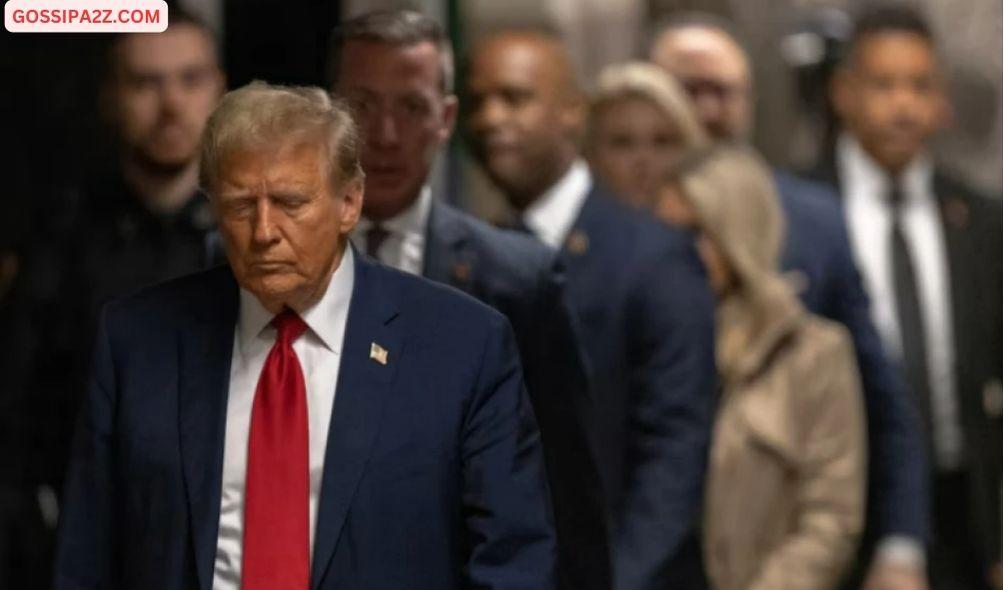What Happens if Trump is Convicted in Hush-Money Trial?
Thirty-four accusations, 12 jurors, a single frequently exasperated judge, and a succession of witnesses comprise the scene.
Following an intensive nearly five-week period, both the prosecution and defense have concluded their presentations in the landmark hush-money case involving Donald Trump.
Closing arguments are slated to commence on Tuesday, with jury deliberations to ensue thereafter. The timeline for their return and the verdict they’ll render remains uncertain.
However, should even one charge result in a guilty verdict, Donald Trump would mark a historic precedent as the first former U.S. president convicted of a criminal offense and the initial major party nominee to vie for the presidency as a felon.
ALSO READ:
- Inside Job Exposed: Kenyan Prison Wardens Convicted for Orchestrating Daring Terrorist Escape
- Uganda Pulls the Plug: Nationwide Internet Blackout Ordered Days Before Crucial General Election
- African Elections Under the Spotlight as Zambia Turns to Kenya Ahead of 2026 Vote
- “Two Drug Barons in Cabinet?” Kenya Government Fires Back as Ex-Deputy President Sparks Explosive Drug Claims
- Kenyan Court Freezes Use of Private Lawyers by Government, Sparks Nationwide Legal Storm
Key inquiries arise concerning the implications of a guilty ruling.
In the event of a guilty verdict, Trump is likely to remain at liberty until a sentencing hearing is scheduled by Justice Juan Merchan, given his current bail status throughout the trial.
The judge must weigh various factors in determining the sentence, including Trump’s age (77), absence of prior convictions, and potential breaches of the court’s gag orders.
Possible penalties may include fines, probation, supervised release, or incarceration.
Trump’s legal team would almost certainly pursue an appeal following a guilty verdict, a process that could extend over several months or longer.
The appellate process would involve scrutiny by the Appellate Division in Manhattan and potentially the Court of Appeals.
Consequently, Trump’s departure from the court in handcuffs is highly improbable, with bail expected to continue during the appeal process.
What grounds might exist for an appeal?
The detailed testimony provided by adult film star Stormy Daniels, central to the case, could serve as one rationale.
Legal experts suggest that while detailed testimony enhances credibility, there exists a threshold beyond which it could be deemed irrelevant or prejudicial.
Trump’s defense team unsuccessfully sought a mistrial twice during Daniels’ testimony, motions that were denied by the judge.
Could Trump face imprisonment?
While plausible, the prospect of Trump serving time in jail following a guilty verdict is remote.
The 34 charges he faces in New York are all classified as class E felonies, the lowest tier in the state, carrying a maximum sentence of four years each.
Justice Merchan could opt for a lesser punishment, considering Trump’s age, lack of prior convictions, and the non-violent nature of the charges.
Furthermore, the unprecedented nature of the case may influence the judge’s decision, potentially steering clear of incarcerating a former president and current political candidate.
Practically, the logistical challenges of incarcerating a former president, including security concerns and associated costs, present formidable hurdles.
Could Trump still pursue the presidency?
Yes, as per the U.S. Constitution, presidential candidates are subject to relatively few eligibility criteria, with no explicit prohibition on candidates with criminal records.
Nonetheless, a guilty verdict could sway the outcome of the November presidential election, as indicated by polling data suggesting potential voter reluctance.
Could he pardon himself?
No, Trump’s ability to issue pardons extends solely to federal offenses, while the hush-money case in New York falls under state jurisdiction.
Similarly, Trump’s legal challenges in Georgia, about allegations of election interference, are subject to state law.
Uncertainty shrouds the issue of pardoning Trump in his remaining federal cases, with constitutional scholars divided on the extent of a president’s pardon powers, especially concerning self-pardon, an unprecedented scenario that Trump could potentially pursue.
What Happens if Trump is Convicted in Hush-Money Trial?
